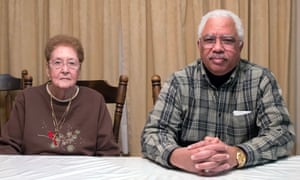The maintenance worker found the woman just before 2pm. She had made her way inside the parking garage in downtown Portland, Oregon, and now stood in the corner of the second floor, mumbling something the worker could not understand. The temperature was about 18F (-7C) with a wind chill. The woman started to remove her pants, a common reaction to severe hypothermia.
He ran to get help from a parking attendant, but by the time they returned, Karen Batts was lying on her back, naked from the waist down and unconscious.
At 2.16pm, medics called Portland police to notify them that Batts, 52, was dead. Within days it would emerge that, months earlier, she had been evicted from her apartment, in part because she had been unable to pay $ 338 in rent.
The death of Batts on 7 January has shaken Portland like few other events in recent memory.
The city’s image of itself as a bastion of liberal values and affable quirkiness is increasingly undermined by the plight of its homeless residents. Amid unusually brutal weather, Batts was among four homeless Portlanders who died of exposure in the first 10 days of 2017.
In the same period, a homeless woman was found holding a dead infant at a bus shelter; the medical examiner ruled it a stillbirth.
The toll on the city streets is rising with each passing year, up from 47 in 2011 to 88 in 2015. Of the recent deaths, Batts’s appears to have resonated the most. And while her death made headlines, a deeper investigation of her story raises difficult questions about whether Portland is failing its neediest citizens.

About five miles from where Batts was found, there is a white craftsman cottage in the middle-class, rapidly gentrifying Hollywood neighborhood. The mantelpiece in the living room is laden with family photos, including one of Batts, a studio portrait taken almost a decade ago at JC Penney. Her smile is broad and unforced. Her hair, in long ringlets, is just beginning to gray at the temples.
The cottage is home to Batts’s mother, Elizabeth, 77, and her brother, Alan, 53. The family knew that Batts’s health was declining. The last time Alan saw her, “she had her fingers in her ears to keep out the voices in her head”, he said. “I asked her if she wanted me to hug her and she said she didn’t want me to touch her.”
But it seemed impossible to do anything. “I was trying to help her,” he said, “but I just kept getting resistance.”
I was trying to help her, but I just kept getting resistance
Batts was born in 1964 in the German town of Heidelberg, while their father was serving in the US army. They returned to Portland when she was six years old, a mixed-race child in a town where African Americans were just 6% of the population.
At Grant high school she was a vivacious, outgoing cheerleader. She loved to dance. Even then, there were signs of what lay ahead. Her mother would find “little jars of spit-up” around the house. Later the family realized that she had an eating disorder, but at the time “I didn’t know what that was,” Elizabeth recalled.
Batts graduated with honors in 1982 and enrolled at Fisk University, a historically black college in Nashville, for a pre-dentistry course. Although she received several small scholarships, it became unaffordable and she dropped out after her first year. She came back to Portland and took intermittent classes at Portland State but was unable to finish the degree.
From then on, Batts drifted between short-term jobs and unstable housing arrangements. The family found it hard to keep track. “She lived in maybe 20 places” from the early 1990s onwards, her brother said. A comment that Batts once made to her mother revealed her mental disarray: “Don’t say too much in the apartment, they can hear me over the sprinkler system.”

In 1995, she went missing altogether, leaving her brother to put up flyers all over the city. When she returned after a few months, she telephoned and acted as though nothing had happened. The family suspects that she was homeless between 2000 and 2002.
Batts’s illness came to a head in December 2003, when she was found unconscious on a Portland street with alcohol poisoning. She was committed to Oregon State Hospital for a year.In 2004, having recovered sufficiently, she moved into a suburban halfway house.
She would never hold down another paying job and survived on disability benefits. At some point she was diagnosed with schizophrenia.Still, taking her medication and attending addiction meetings, it seemed like Batts had regained a measure of control over her life.
Batts spent most of her last decade in a downtown building for seniors and people with disabilities, owned by a nonprofit called Northwest Housing Alternatives, or NHA. For most of her time there she was stable – well enough, even, to join a family vacation to Hawaii in 2009.
Yet years later something tipped her off balance. Her brother theorizes it was when she stopped taking her medication.
Martha McLennan, the executive director of NHA, said that Batts started displaying serious behavioral problems in early 2016. She caused “damage, disruptions and hazards of different types”, such as entertaining rowdy guests, and was apparently consuming wood alcohol. Police records indicate that Batts was the victim of an assault.
As she racked up lease violations, on-site staff tried to connect her with mental health services, but Batts declined to engage with them. McLennan said there was nothing else they could do. “We’re a housing organization, not a mental-health organization,” she said.
Alan also pushed to get help for his sister, but she often refused visitors, including him. He called various county authorities and services, but each time found himself stymied. Police spoke to her through the door and did not consider her a danger to herself.

In September of last year, Batts received an eviction notice over her erratic behavior and failure on two consecutive months to pay rent.
Batts did not attend her eviction hearing, and on her last day, 27 October, the sheriff’s department was called to provide an escort off the property.
McLennan said that such evictions on NHA properties are rare and usually prevented. “She was evaluated for a mental health hold a number of times,” McLennan said, but “the standard required is a really high bar.”
Batts fell into an impossible middle ground, according to McLennan: healthy enough to refuse help, but perhaps too sick to recognize that she needed it.
“She didn’t really have the capacity to make positive choices, but the system says she has the right to make bad choices.”
It is not entirely clear how Batts spent her final months. But it appears she drifted into Portland’s homeless population, only occasionally attracting attention from law enforcement.
In early November, police found Batts in the middle of the street in a run-down part of downtown. She wasn’t wearing a jacket, shoes or pants.
As they got closer, they realized that she had been consuming hand sanitizer. “She was drinking it to keep her mouth clean,” according to a police report of the incident. “She had several bottles on her person.”
The police took Batts to the hospital, where she was placed on psychiatric hold. But soon, for reasons that are not fully clear, she was let back out onto the streets.
The following month, she received a ticket for sleeping on the train. The month after that, she would find her way to the parking garage where she died.
A Multnomah County investigation is under way into Batts’s death, involving what it calls a “full system analysis”.
McLennan said her organization has done some “soul-searching” since Batts’s death. “If things fall apart again, what systems are there to provide resilience? If someone doesn’t have strong systems, what is going to catch them?”
She also said she regrets the eviction. “But given the same set of circumstances, would it have the same result? You know, there’s a point at which we have to look after the interests of the neighbors and the property.”
Instead of laying individual blame, onlookers condemn a fragmented web of social services that prevents even the most well-intentioned from averting tragedy. “I am angry all the time, justifiably so,” said Benji Bao Vuong, a Portland activist. “There is no holistic, integrated treatment for the houseless person.”
A spokesperson for Portland’s new mayor, Ted Wheeler, defended his record, noting that the city opened 750 additional beds during the severe weather and that nobody who sought shelter was turned away.
Housing and homelessness were already hot-button topics in the city, but since the deaths there is a sense of greater urgency. Wheeler has co-sponsored an ordinance that will compel landlords to assist with relocation costs for tenants subject to no-cause evictions.
Back at the Batts family home in the Hollywood district, Alan, who spent 11 years in the air force and is a calm and steady man, struggled to control his emotions as he remembered his inability to help his sister. He recalled the last time he saw her alive, about a year before she died. They were walking together to a local train station.
“She asked me for a cup of hot water,” he said. “She didn’t drink tea or coffee, she just wanted to warm her hands.”
He watched as his sister walked into a bank where there was a counter offering drinks. She got what she needed. Then she walked away.
The death of Karen Batts: the homelessness case that shocked Portland
